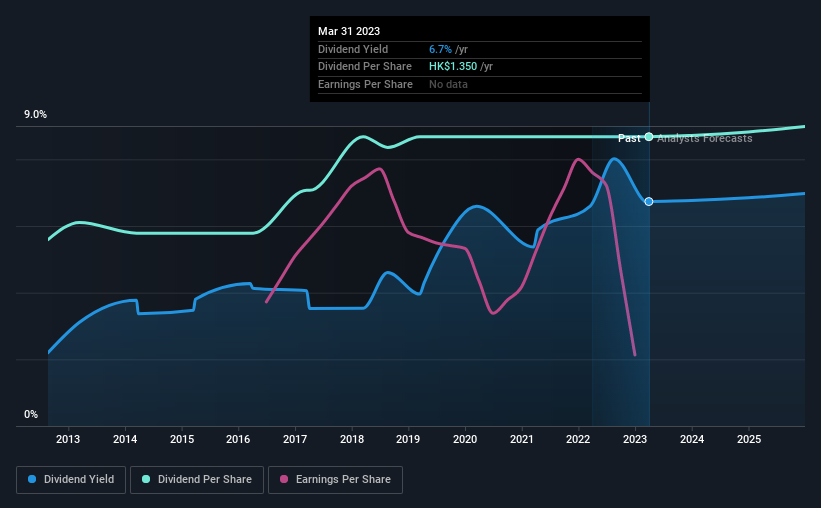The board of Kerry Properties Limited (HKG:683) has announced that it will pay a dividend on the 16th of June, with investors receiving HK$0.95 per share. This means the annual payment is 6.7% of the current stock price, which is above the average for the industry.
Check out our latest analysis for Kerry Properties
Kerry Properties' Earnings Easily Cover The Distributions
Impressive dividend yields are good, but this doesn't matter much if the payments can't be sustained. The last payment made up 71% of earnings, but cash flows were much higher. In general, cash flows are more important than earnings, so we are comfortable that the dividend will be sustainable going forward, especially with so much cash left over for reinvestment.
Looking forward, earnings per share is forecast to rise by 98.1% over the next year. Assuming the dividend continues along recent trends, we think the payout ratio could be 37% by next year, which is in a pretty sustainable range.

Kerry Properties Has A Solid Track Record
The company has a sustained record of paying dividends with very little fluctuation. Since 2013, the dividend has gone from HK$0.87 total annually to HK$1.35. This implies that the company grew its distributions at a yearly rate of about 4.5% over that duration. While the consistency in the dividend payments is impressive, we think the relatively slow rate of growth is less attractive.
The Dividend Has Limited Growth Potential
The company's investors will be pleased to have been receiving dividend income for some time. However, things aren't all that rosy. Kerry Properties' earnings per share has shrunk at 22% a year over the past five years. This steep decline can indicate that the business is going through a tough time, which could constrain its ability to pay a larger dividend each year in the future. However, the next year is actually looking up, with earnings set to rise. We would just wait until it becomes a pattern before getting too excited.
In Summary
Overall, we think Kerry Properties is a solid choice as a dividend stock, even though the dividend wasn't raised this year. With shrinking earnings, the company may see some issues maintaining the dividend even though they look pretty sustainable for now. The payment isn't stellar, but it could make a decent addition to a dividend portfolio.
Companies possessing a stable dividend policy will likely enjoy greater investor interest than those suffering from a more inconsistent approach. At the same time, there are other factors our readers should be conscious of before pouring capital into a stock. Taking the debate a bit further, we've identified 2 warning signs for Kerry Properties that investors need to be conscious of moving forward. If you are a dividend investor, you might also want to look at our curated list of high yield dividend stocks.
Valuation is complex, but we're here to simplify it.
Discover if Kerry Properties might be undervalued or overvalued with our detailed analysis, featuring fair value estimates, potential risks, dividends, insider trades, and its financial condition.
Access Free AnalysisHave feedback on this article? Concerned about the content? Get in touch with us directly. Alternatively, email editorial-team (at) simplywallst.com.
This article by Simply Wall St is general in nature. We provide commentary based on historical data and analyst forecasts only using an unbiased methodology and our articles are not intended to be financial advice. It does not constitute a recommendation to buy or sell any stock, and does not take account of your objectives, or your financial situation. We aim to bring you long-term focused analysis driven by fundamental data. Note that our analysis may not factor in the latest price-sensitive company announcements or qualitative material. Simply Wall St has no position in any stocks mentioned.
About SEHK:683
Kerry Properties
An investment holding company, engages in the development, investment, management, and trading of properties in Hong Kong, Mainland China, and the Asia Pacific region.
Reasonable growth potential average dividend payer.
Similar Companies
Market Insights
Community Narratives




